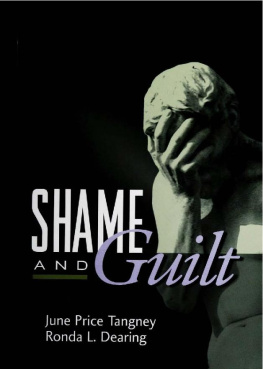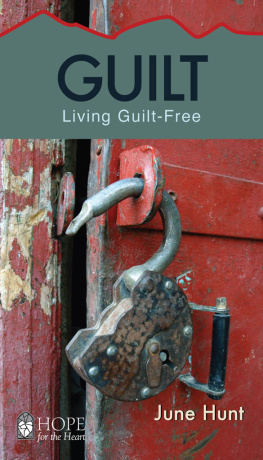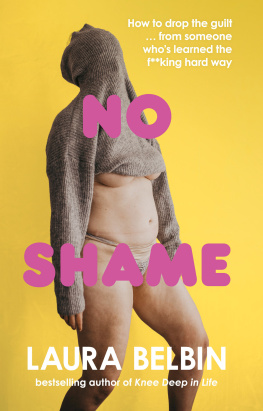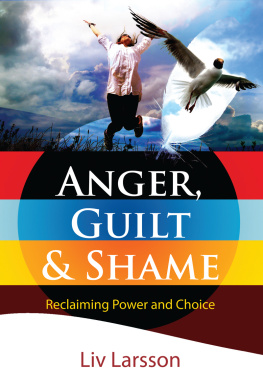AND
June Price Tangney Ronda L Dearing
SHAME AND GUILT
EMOTIONS AND SOCIAL BEHAVIOR Series Editor: Peter Salovey, Yale University
Shame and Guilt
June Price Tangney and Ronda L. Dearing
Ostracism: The Power of Silence Kipling D. Williams
Emotions: Current Issues and Future Directions Tracy J. Mayne and GeorgeA.Bonanno,Editors
Mood and Temperament David Watson
Expressing Emotion: Myths, Realities, and Therapeutic Strategies Eileen Kennedy-Moore and Jeanne C. Watson
Embarrassment: Poise and Peril in Everyday Life Rowland S. Miller
Social Anxiety
Mark R. Leary and Robin M. Kowalski
Breaking Hearts: The Two Sides of Unrequited Love Roy E Baumeister and Sara R. Wotman
Jealousy:Theory,Research, and ClinicalStrategies Gregory L. White and Paul E. Mullen
SHAME AND GUILT
June Price Tangney Ronda l. Dearing
Series Editor's Note hy Peter Salovey
The Guilford Press New York London
2002 The Guilford Press
A Division of Guilford Publications, Inc. 72 Spring Street, New York,NY 10012 www.guilford.com
All rights reserved
Paperback edition 2004
No part of this book may be reproduced, translated, stored in a retrieval system, or transmitted, in any form or by any means, electronic, mechanical,photocopying,microfilming,recording,
or otherwise, without written permission from the Publisher.
Printed in the United States of America This book is printed on acid-free paper. Last digit is print number: 9 8 7 6 5 4 3
Library of Congress Cataloging-in-Publication Data
Tangney, June Price.
Shame and guilt / June Price Tangney and Ronda L. Dearing.
p.cm. (Emotionsandsocialbehavior)
Includes bibliographical references and index.
ISBN 1-57230-715-3 (hard) ISBN 1-57230-987-3 (paper)
1. Shame. 2. Guilt. I. Dearing, Ronda L. II. Title. III. Series.
BF575.S45 T36 2002
152.^)dc21 2001050143
To m y intellectual "Dads," Joseph Masling and Seymour Feshbach
J-P- T.
To m y family,
for their ongoing encouragement and support
R . L. D.
ABOUT THE AUTHORS
June Price Tangney, PhD, is Professor of Psychology at George Mason University. As an undergraduate, she worked with Dr. Joseph Masling at SUNY, Buffalo, and completed her doctorate in clinical psychology from the University of California-Los Angeles under the direction of Dr. Seymour Feshbach. Coeditor,with Kurt W. Fischer,ofSelf-Conscious Emotions: The Psychology of Shame, Guilt, Embarrassment, and Pride, she is currently Associate Editor for Self and Identity, and Consulting Editor for Joumal of Personality and Social Psychology, Personality and Social Psychology Bulletin, Psychological Assessment, and Journal of Personality. Her research has been funded by the National Institute of Child Health and Human Development and theJohn Templeton Foundation.
Ronda L. Dearing, PhD, is a Postdoctoral Associate at the Researc Institute on Addictions in Buffalo, New York. She became involved in
the study of shame and guilt during her graduate training in clinical psychology at George Mason University, while working as a research assistant with June Tangney. Prior to her training in psychology, she worked as a medical technologist. Her doctoral dissertation focused on predictors of psychotherapy help seeking in therapists-in-training. More recent interests include help seeking in substance abuse, substance abuse treatment approaches, and the influence of shame-proneness on substance use.
VII
h
SERIES EDITOR'S NOTE
One of the most enjoyable aspects of being the Series Editor for Guilford's Emotions and Social Behavior series is that I occasionally have the opportunity to shepherd to publication a book by an old friend.Suchis the case for thislatestvolume inthe series.Shame and Guilt, by my dear friendJune Price Tangney (cowritten with Ronda L. Dearing). June and I have known each other for nearly years, al- though w e suspect that w e encountered each other closer to 30 years ago as students in the same cohort at rival high schools in the suburbs ofBuffalo, New York. As fellowclinicalpsychologists by training, but social psychologists by professional identification, I have always felt that Dr. Tangney and I shared a similar fondness for the rigorous empirical exploration of social processes in ecologically interesting contexts. No doubt, you willalsoshare my enthusiasm forher cutting-edge ap- proach to the emotions of shame and guilt, their relationship to each other, and their vastly different consequences for one's sense of self.
Thebook'sanalysis of shame and guilt,respectively,beginswith a difference in emphasis.Shameisfocused ona failing in theself ("Look what I've done"), but guilt focuses on morally disappointing behavior ("Look what I've done"). This distinction is rooted in the theorizing of thelateHelenBlockLewis, an inspiringteacherduring my graduate ed- ucationatYale.Giventhisdistinction,itshould notbe surprisingthat while guilt can motivate individuals to try to behave in especially prosocialways in order to expiateit,shame can induceintenserage as
IX
X Series Editor's Note
one experiences a threatened and diminished sense of self. From t starting point,June Tangney and Ronda Dearing provide a host of insights about the conceptualization and measurement of shame and
guilt, their phenomenology, and the social consequences of these profoundly disturbing emotions. You will find this volume quite stimulat-
ing, especially if you are already familiar with this series and have read Mark R. Leary and Robin M. Kowalski's inspiring analysis in Social Anxiety and/or Rowland S. Miller's charming musings in Embarrassment: PoiseandPerilinEverydayLife.Iknowthatyouwilldiscoverthisbook to be just as intriguing.
Peter Salovey, PhD
Chris Argyris Professor and Chair of Psychology Yale University
h
ACKNOWLEDGMENTS
We oweagreatintellectualdebttoYalepsychologistHelenBlockLewis, the quintessential scientist-practitioner wholong before it was in voguecombined keen clinical observations with the rigors of psychological theory and empirical research. The result, in 1971, was an entirely new conceptualization of shame and guiltone which formed the foundation for our research. Helen died in 1987, but her work lives on.
June Price Tangney
I would like to thank the many teachers, colleagues, and students haveshapedmy thinkingovertheyears.I'mgratefultothosewhoen-richedmy yearsasanundergraduateatSUNY,Buffalo,especiallyJim Sawusch,who taughtmy undergraduatecourseinresearchmethods; Irving Biederman, w h o gave m e m y first job and introduced m e to m y husband; and Joseph Masling, who was amazingly generous with his
time, warmth and wisdom, mentoring a fledgling undergraduate. M y graduate years at U C L A were nothing less than exhilarating. I'm espe-ciallygratefultoSeymour and Norma Feshbach fortheirwarmth,hu-mor, support, and countless intellectual gifts. As m y primary advisor, Sy instilled in m e the importance of using flexible scientific methods to ad-dresspressingsocialissues. Norma hasservedasamodel,teaching me how to tackle intriguing, but elusive,emotional processes and wrestle
xi
xii Acknowledgments
them to the ground. My first two years of teaching, at Bryn Mawr lege,were pivotal.Bryn Mawr was the birthplace of our measures of shame and guilt,many thanks to my students and collaborators Sus-anneBurggraf,BarbaraDomingos,andHanneHamme.And thiswork
was further enhanced by muchneeded guidance and encouragement from the chair,Rob Wozniak, and my colleague Mary Rohrkemper McCaislin. The vast majority of the work summarized in this volume was conducted over the past 13 years at George Mason University, in a remarkably collegial and intellectually rich department. I wish to thank Patricia Wagner especially, who as a first-year graduate student helped establish our lab; Ronda Dearing, who made this long journey of writing a delightful intellectual adventure; m y dear friends and colleagues
Next page






